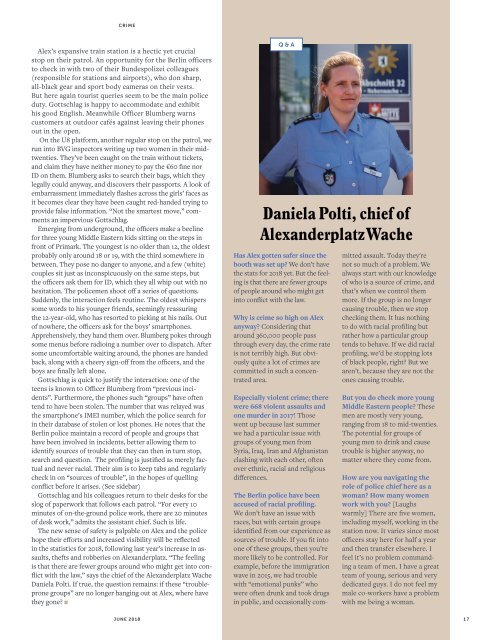EXB 172
You also want an ePaper? Increase the reach of your titles
YUMPU automatically turns print PDFs into web optimized ePapers that Google loves.
CRIME<br />
CRIME<br />
Alex’s expansive train station is a hectic yet crucial<br />
stop on their patrol. An opportunity for the Berlin officers<br />
to check in with two of their Bundespolizei colleagues<br />
(responsible for stations and airports), who don sharp,<br />
all-black gear and sport body cameras on their vests.<br />
But here again tourist queries seem to be the main police<br />
duty. Gottschlag is happy to accommodate and exhibit<br />
his good English. Meanwhile Officer Blumberg warns<br />
customers at outdoor cafés against leaving their phones<br />
out in the open.<br />
On the U8 platform, another regular stop on the patrol, we<br />
run into BVG inspectors writing up two women in their midtwenties.<br />
They’ve been caught on the train without tickets,<br />
and claim they have neither money to pay the €60 fine nor<br />
ID on them. Blumberg asks to search their bags, which they<br />
legally could anyway, and discovers their passports. A look of<br />
embarrassment immediately flashes across the girls’ faces as<br />
it becomes clear they have been caught red-handed trying to<br />
provide false information. “Not the smartest move,” comments<br />
an impervious Gottschlag.<br />
Emerging from underground, the officers make a beeline<br />
for three young Middle Eastern kids sitting on the steps in<br />
front of Primark. The youngest is no older than 12, the oldest<br />
probably only around 18 or 19, with the third somewhere in<br />
between. They pose no danger to anyone, and a few (white)<br />
couples sit just as inconspicuously on the same steps, but<br />
the officers ask them for ID, which they all whip out with no<br />
hesitation. The policemen shoot off a series of questions.<br />
Suddenly, the interaction feels routine. The oldest whispers<br />
some words to his younger friends, seemingly reassuring<br />
the 12-year-old, who has resorted to picking at his nails. Out<br />
of nowhere, the officers ask for the boys’ smartphones.<br />
Apprehensively, they hand them over. Blumberg pokes through<br />
some menus before radioing a number over to dispatch. After<br />
some uncomfortable waiting around, the phones are handed<br />
back, along with a cheery sign-off from the officers, and the<br />
boys are finally left alone.<br />
Gottschlag is quick to justify the interaction: one of the<br />
teens is known to Officer Blumberg from “previous incidents”.<br />
Furthermore, the phones such “groups” have often<br />
tend to have been stolen. The number that was relayed was<br />
the smartphone’s IMEI number, which the police search for<br />
in their database of stolen or lost phones. He notes that the<br />
Berlin police maintain a record of people and groups that<br />
have been involved in incidents, better allowing them to<br />
identify sources of trouble that they can then in turn stop,<br />
search and question. The profiling is justified as merely factual<br />
and never racial. Their aim is to keep tabs and regularly<br />
check in on “sources of trouble”, in the hopes of quelling<br />
conflict before it arises. (See sidebar)<br />
Gottschlag and his colleagues return to their desks for the<br />
slog of paperwork that follows each patrol. “For every 10<br />
minutes of on-the-ground police work, there are 20 minutes<br />
of desk work,” admits the assistant chief. Such is life.<br />
The new sense of safety is palpable on Alex and the police<br />
hope their efforts and increased visibility will be reflected<br />
in the statistics for 2018, following last year’s increase in assaults,<br />
thefts and robberies on Alexanderplatz. “The feeling<br />
is that there are fewer groups around who might get into conflict<br />
with the law,” says the chief of the Alexanderplatz Wache<br />
Daniela Polti. If true, the question remains: if these “troubleprone<br />
groups” are no longer hanging out at Alex, where have<br />
they gone? n<br />
Q & A<br />
Daniela Polti, chief of<br />
Alexanderplatz Wache<br />
Has Alex gotten safer since the<br />
booth was set up? We don’t have<br />
the stats for 2018 yet. But the feeling<br />
is that there are fewer groups<br />
of people around who might get<br />
into conflict with the law.<br />
Why is crime so high on Alex<br />
anyway? Considering that<br />
around 360,000 people pass<br />
through every day, the crime rate<br />
is not terribly high. But obviously<br />
quite a lot of crimes are<br />
committed in such a concentrated<br />
area.<br />
Especially violent crime; there<br />
were 668 violent assaults and<br />
one murder in 2017! Those<br />
went up because last summer<br />
we had a particular issue with<br />
groups of young men from<br />
Syria, Iraq, Iran and Afghanistan<br />
clashing with each other, often<br />
over ethnic, racial and religious<br />
differences.<br />
The Berlin police have been<br />
accused of racial profiling.<br />
We don’t have an issue with<br />
races, but with certain groups<br />
identified from our experience as<br />
sources of trouble. If you fit into<br />
one of these groups, then you’re<br />
more likely to be controlled. For<br />
example, before the immigration<br />
wave in 2015, we had trouble<br />
with “emotional punks” who<br />
were often drunk and took drugs<br />
in public, and occasionally committed<br />
assault. Today they're<br />
not so much of a problem. We<br />
always start with our knowledge<br />
of who is a source of crime, and<br />
that’s when we control them<br />
more. If the group is no longer<br />
causing trouble, then we stop<br />
checking them. It has nothing<br />
to do with racial profiling but<br />
rather how a particular group<br />
tends to behave. If we did racial<br />
profiling, we’d be stopping lots<br />
of black people, right? But we<br />
aren’t, because they are not the<br />
ones causing trouble.<br />
But you do check more young<br />
Middle Eastern people? These<br />
men are mostly very young,<br />
ranging from 18 to mid-twenties.<br />
The potential for groups of<br />
young men to drink and cause<br />
trouble is higher anyway, no<br />
matter where they come from.<br />
How are you navigating the<br />
role of police chief here as a<br />
woman? How many women<br />
work with you? [Laughs<br />
warmly] There are five women,<br />
including myself, working in the<br />
station now. It varies since most<br />
officers stay here for half a year<br />
and then transfer elsewhere. I<br />
feel it’s no problem commanding<br />
a team of men. I have a great<br />
team of young, serious and very<br />
dedicated guys. I do not feel my<br />
male co-workers have a problem<br />
with me being a woman.<br />
JUNE 2018<br />
17

















